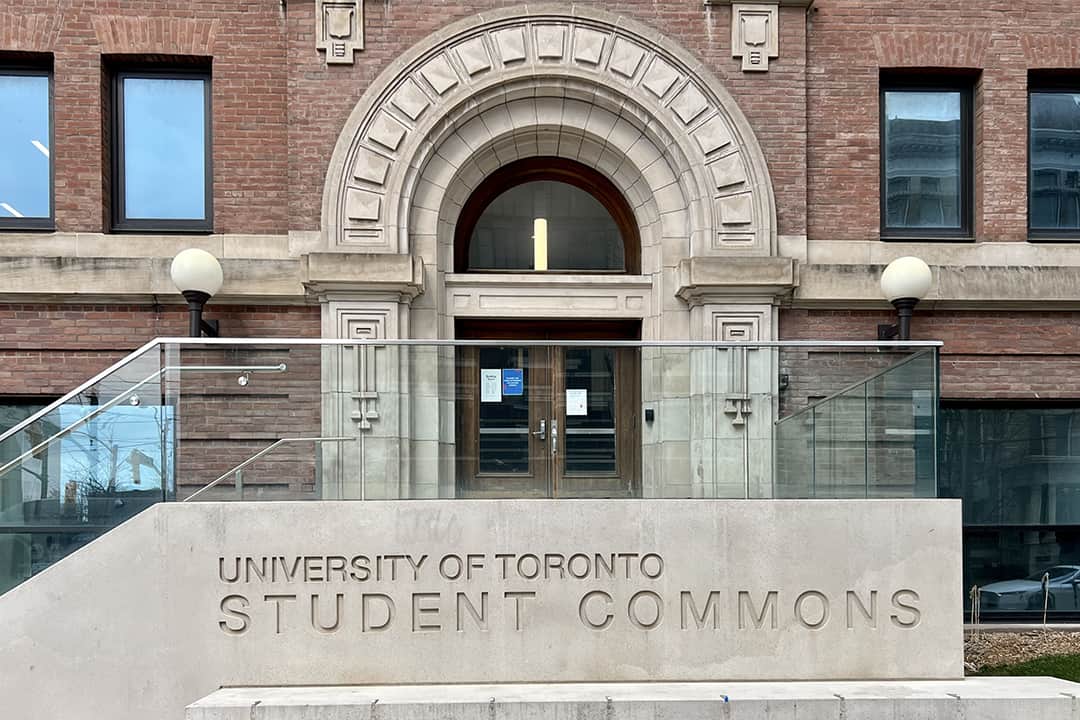During the 2022–2023 term, the University of Toronto Students’ Union (UTSU) opened the Student Commons, planned the first in-person orientation since 2019, changed its governance structure, and held numerous events including Expression Against Oppression. They also faced controversy over the Royal Bank of Canada (RBC) branch located in the Commons.
The Varsity took a look at the UTSU’s accomplishments under the leadership of President Omar Gharbiyeh as his successor, Elizabeth Shechtman, prepares to take office.
Gharbiyeh’s campaign goals
In an interview with The Varsity before his election, Gharbiyeh stated that he would prioritize working to eliminate gender-based violence at UTSG, proactively addressing the pandemic and urging the university for better dining hall food security. Gharbiyeh also hoped to continue the 2021 Same Degree, Same Fee campaign, which advocated for one fee for both international and domestic students.
Representatives from the UTSU addressed multiple U of T governance bodies leading up to the Governing Council’s decision to approve revisions to the Policy on Sexual Violence and Sexual Harassment. The UTSU joined the Prevention, Empowerment, Advocacy, Response for Survivors (PEARS) Project in arguing that the revised policy did not take sufficient measures to protect students. UTSU representatives also attended multiple PEARS Project events advocating for the removal of UTM Professor Robert Reisz. From March 13–17, the union hosted Action For Consent Today week, which included trauma-informed activities and discussion forums.
The UTSU did not publicize any efforts to increase dining hall food security. In a statement to The Varsity, Gharbiyeh wrote that the union focused this year on expanding the existing Food Bank from biweekly to weekly service and introducing a new Food Rescue initiative supplying prepared food to U of T students, in partnership with MealCare and U of T Food Services. The union decided to expand its services instead of lobbying administration because expanding services was “the most immediate path for affecting the welfare of students facing food-insecurity.” Gharbiyeh also mentioned that the UTSU plans to announce updates about opening a café in the Student Commons “very soon.”
In terms of responding to the ongoing pandemic, Gharbiyeh noted that the union has lobbied the university to respond more strategically and predictably to emergencies such as new variants and offer hybrid and online course options. The Same Degree, Same Fee Campaign remains on the UTSU’s website as a current campaign.
Major changes and controversies
At the UTSU’s 2022 Annual General Meeting, students approved a measure to reduce the number of seats on the Board of Directors (BOD) from 44 to 12 and create a student senate with 75 available seats. Before the change, the BOD had difficulty meeting quorum — an issue which has somewhat persisted.
Some students have criticized the new governance structure, arguing that the senate doesn’t address the problem of limiting representation because the bylaws only grant the senate limited power. In a statement to The Varsity, Gharbiyeh wrote, “The Senate is in fact the only available answer to the question of representation.” He argued that giving the senate fewer fiduciary responsibilities compared to the BOD allows students to become senators without taking on excessive obligations, increasing the senate’s accessibility and allowing senators to remain outspoken about issues that the UTSU cannot typically address.
Students approved the Community Housing and Employment Service Support levy in the Spring 2023 election, increasing fees by four dollars for all U of T students. The UTSU plans to use the levy to implement initiatives such as a lease inspection service, career supports, online guides, and an online portal with housing and employment postings.
Environmental groups on campus have protested the RBC branch located in the Student Commons, highlighting that RBC is the largest funder of fossil fuels in Canada and calling on the UTSU to sever ties with the bank. On March 30, the UTSU BOD passed a resolution to authorize the executive committee to begin discussions with RBC to close the on-campus branch after its five-year term, investigate other options for the UTSU’s everyday banking, transfer net assets to a credit union, and prohibit RBC from sponsoring the union’s events. Gharbiyeh wrote that the union hopes “students remember that they can make a difference and the UTSU is listening.”
Disclosure: Elizabeth Shechtman was an associate news editor at The Varsity in the 2021–2022 academic year.


